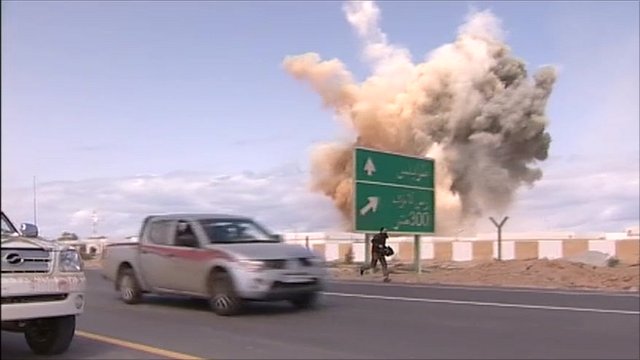 Libyan leader Col Muammar Gaddafi has made a defiant speech, blaming outside forces for the uprising in the country, as government forces pounded the western city of Zawiya.
Libyan leader Col Muammar Gaddafi has made a defiant speech, blaming outside forces for the uprising in the country, as government forces pounded the western city of Zawiya.
Col Gaddafi said European governments and al-Qaeda had incited Libyan youth to revolt.
Meanwhile, pro-Gaddafi forces shelled Zawiya's suburbs and tried to gain control of the main square.
The US has said any decision on a no-fly zone over Libya rests with the UN.
More than 1,000 people are believed to have died since rebels began their uprising nearly three weeks ago to end Col Gaddafi's 41 years in power. About 212,000 people - most of them migrant workers - have fled the country, the UN estimates.
'Rambling' speech
In the early hours of Wednesday morning, Libyan state TV showed pictures of Col Gaddafi speaking to tribal supporters. He said European governments and al-Qaeda were trying to divide the country.
"There is no choice for the people of Benghazi but to go out on the streets - men, women and children to rid Benghazi of this betrayal," Col Gaddafi said. "Benghazi, which used to be beautiful, is turning into ruins. It must be liberated."
The eastern city of Benghazi has become the headquarters for the revolt.
The BBC's Wyre Davies, in Tripoli, says the Libyan leader appeared in increasingly confident and belligerent mood.
In what our correspondent describes as a typically rambling speech, the colonel showed no sign of a willingness to compromise or talk to the opposition.
In a separate interview for the French TV news channel LCI, Col Gaddafi labelled the uprising a "colonialist plot".
"I cannot fight against my people, that's a lie by colonising countries: France, Britain, the Americans," he said.
The city of Zawiya, which fell to the rebels two weeks ago, is almost completely cut off by government forces. However, there were reports of heavy shelling and considerable loss of life, as the rebels tried to repel a huge onslaught by pro-Gaddafi troops.
One resident spoke of seeing 50 tanks and dozens of pick-up trucks loaded with pro-Gaddafi troops. The main hospital was said to have been overwhelmed with casualties.
"There are many dead people and they can't even bury them," a fighter called Ibrahim told the Reuters news agency. "Zawiya is deserted. There's nobody on the streets. No animals, not even birds in the sky," he said.
In eastern Libya, rebel forces in the oil port of Ras Lanuf came under frequent air and artillery attacks. At least 30 people were reported injured.
The BBC's Jon Leyne, in Benghazi, says the rebels are holding on, despite the pounding from government forces.
In Zawiya, the army is having to flatten the whole town to put down uprising, our correspondent says, and Col Gaddafi is using a substantial chunk of his army there.
Options
Calls for military intervention are growing as pro-Gaddafi forces step up their counter-offensive.
However, US Secretary of State Hillary Clinton has cautioned that any decision to impose a no-fly zone over Libya should be made by the UN and not by Washington.
Mrs Clinton said it was important such a move came from the Libyan people, rather than being a US-led effort.
A no-fly zone would probably ban military flights by government forces through Libyan airspace. Any aircraft violating the exclusion zone would risk being shot down by international forces.
No-fly zones were imposed on southern and northern Iraq in the wake of the first Gulf war in 1991, and during the war in Bosnia in 1994-95.
US President Barack Obama and UK Prime Minister David Cameron discussed a possible no-fly zone on Tuesday, but both countries maintain that any intervention must have wide international support.
A White House statement said the two leaders discussed a "full spectrum of possible responses" in their telephone call.
It is believed other options include more surveillance, humanitarian help and the enforcement of an arms embargo on Libya.
Mr Cameron told the BBC: "We have got to prepare for what we might have to do if he (Gaddafi) goes on brutalising his own people."
The UK and France are working on a UN Security Council resolution for a no-fly zone; however, Russia has already stated its opposition to military intervention.
Nato defence ministers will discuss options for Libya on Thursday and Friday.
In Washington, President Obama has faced criticism that he is being too cautious over the turmoil in Libya.
Republican Senator John McCain said: "Every day and every hour that goes by, innocent Libyans are being attacked and massacred from the air."
Calls for a no-fly zone have also come from the Organisation of the Islamic Conference, which represents Muslim-majority countries, and Gulf Arab states.



